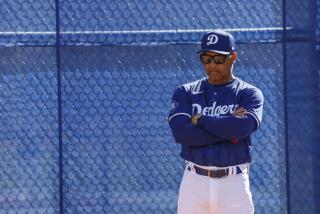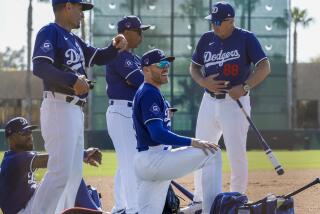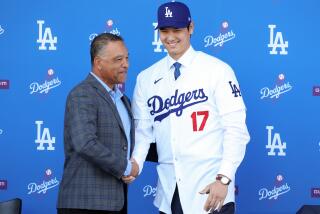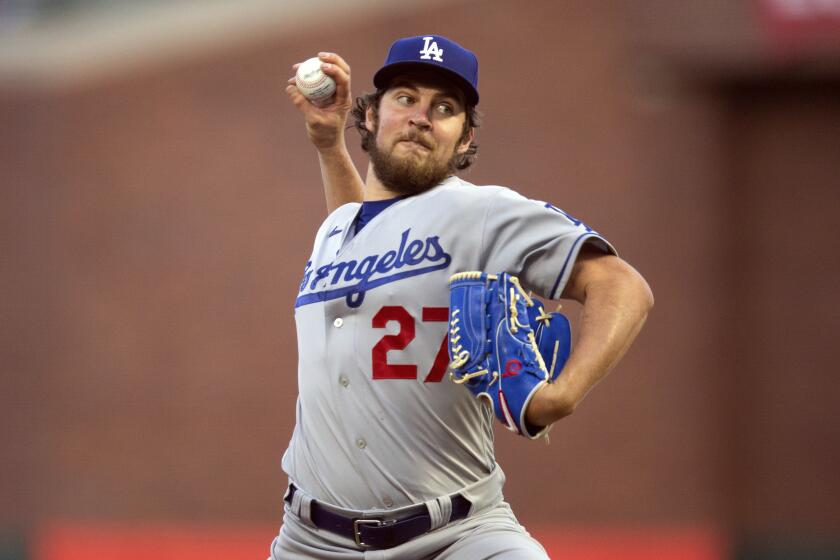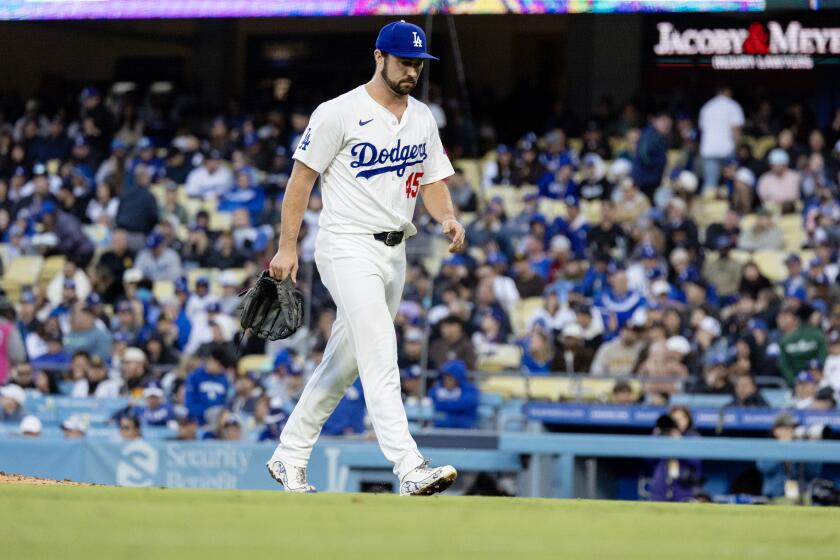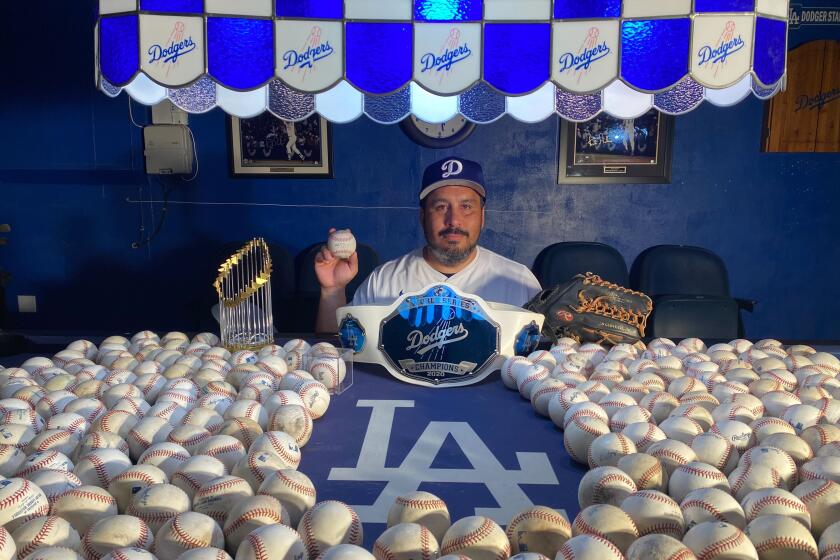Dave Roberts manages to stay the course
His irritation from the weekend had not faded. His apprehension about the week ahead had not been quashed. Dave Roberts planned to shield his players from both emotions. As manager of the Dodgers, he performs a daily ritual of alchemy, converting frustration into optimism, concern into calm. In his third year at the helm, the mask he chooses to wear has become his face.
“For me, it’s about never showing panic,” Roberts said as he sat at a True Food Kitchen outside downtown San Diego last week ahead of a series with the Padres, and days before the All-Star break.
This particular moment of the season challenged Roberts’ constant search for equilibrium. He views the clubhouse like a globe spinning on its axis. He can influence the environment, but he prefers gentle gusts over heavy gales. The approach has guided him to two division titles, through the heartache of last fall and the hangover of this spring.
So he suppressed his disgust about losing a sloppy series to the Angels. Roberts thought ahead to the external conundrum of the next seven days. He remembered how this time felt as a player, close enough to touch the break, a respite from baseball’s nine-month marathon. He fretted about his team overlooking four games with the Padres and envisioning the beach. He shook his head — this he could not abide.
“Once we get to the ballpark, our job is to win a baseball game,” he said. “Not to be on your phone, talking to a travel agent and talking to your teammates about going to Hawaii or Mexico.”
Roberts won National League Manager of the Year in his first season. He led the team to the World Series in his second. Yet his third season, which will pause this week as Roberts manages the National League in the All-Star Game on Tuesday at Nationals Park, has presented its own set of obstacles: A cavalcade of injuries, a sluggish start that wrought continuous anguish, and the malaise of a team which knows only October matters.
Roberts disdains team meetings. He believes subtle but consistent reinforcement outweighs abrupt intervention. As he pondered how to influence his players before their first game in this series against the Padres, he settled on an extra dose of unflagging optimism. “For something like that, I make a concerted effort to come in very high-energy,” he said.
A couple of hours later, the Dodgers lounged inside the visitors’ clubhouse. The voice of their manager boomed across the hall. He gabbed with anyone who crossed his path. He greeted hitters and closers and broadcasters with the same buoyancy.
“Cody! How you doing, buddy?”
“What’s up, Kenley!”
“Joe D.!”
Roberts stung the backside of Joe Davis. He held a cup of coffee and wore a smile. He bounded from the food room to his office. His behavior was performative but purposeful.
The atmosphere inside the clubhouse was light. A group of seven Dodgers surrounded Matt Kemp as he regaled them with stories from his travails at the Home Run Derby. The group gathered behind an iPhone and cackled at Yasiel Puig’s homer-free foray in the 2014 Derby.
“He didn’t know he had to bring a pitcher,” Justin Turner said.
“Oh, he didn’t?” Kemp said.
“He was like, ‘No one told me,’” Turner said.
“Are you serious?” Kemp said.
The laughter subsided and the players dispersed to take swings in the cage or receive treatment in the trainer’s room. Inside his office, Roberts studied the opposing lineup with pitching coach Rick Honeycutt. The delicate machine hummed along. The Dodgers won that night by six runs. Three days later, they stood alone in first place of the National League West for the first time all season.
---
On May 16, after a loss to the cellar-dwelling Miami Marlins, the Dodgers fell to 16-26. They had lost six games in a row, all to the Marlins and the Cincinnati Reds, two tanking teams. The Dodgers resided in fourth place in the division. They trailed Arizona by 8½ games.
The situation looked bleak. The hitters lacked power. The starters made abbreviated outings. The relievers sprinkled gasoline on fires. Clayton Kershaw was sidelined with an arm injury, Corey Seager was out for the season and Turner had only just returned from the disabled list.
Earlier that day in Miami, Roberts dropped a quote often attributed to Winston Churchill. “If you’re going through hell,” Roberts said, “keep going.” He was grinning when he spoke. A few hours later, following another dispiriting defeat, the smile was gone. “I feel bad for our ballclub,” he said.
The losing gnawed at the manager. But he had been through worse last year, when the Dodgers lost 16 of 17 games late in the season and looked comatose heading into the playoffs. The team rallied to reach the World Series. Roberts felt a similar turnaround was possible in 2018, even if it looked unlikely.
As the losses piled up, Roberts kept practicing his alchemy. He vented after one particularly gruesome loss to Cincinnati, telling reporters, “This isn’t a ‘try’ league; everyone is trying,” but otherwise held his keel even. He swallowed anger and projected positivity. His demeanor during this stretch impressed general manager Farhan Zaidi.
Roberts showed “the right mixture of disappointment, frustration, but also understanding there’s a game to be played the next day, and being overly self-absorbed about a loss doesn’t really help anybody,” Zaidi said. “When things are going bad, like they were last September, like they were early this year, I think that’s an incredibly valuable leadership quality.
“Guys are looking around, waiting for reasons to panic. When the guy in that position is mad, but confident we’re going to turn things around, it has a lot to do with how we withstand some of these stretches.”
Facing a nearly double-digit deficit in the division, Roberts implored his players to narrow their focus to daily increments. The Dodgers beat the Marlins on May 17 to avoid a sweep. After a rainout in Washington, they won a doubleheader over the Nationals and swept a series, with Roberts hollering “it’s going to be special!” in the dugout during a comeback victory. They went 6-4 on a homestand at Dodger Stadium. They reached .500 a week later, nosing upward in the standings as the Diamondbacks stumbled.
The players deserve credit for the revival, Roberts insisted. He did not show Max Muncy how to unlock his power. He did not advise Ross Stripling to unleash his curveball. He did fix Scott Alexander’s delivery during a spell in the minors. These are organizational successes, a blend of the coaching staff’s advice, the developmental system’s acumen and the player’s adaptability.
Yet players and Dodgers officials lauded Roberts for fostering a culture in which the unit can thrive. No longer do the players blanch if stars fall victim to injuries. When Turner’s wrist was broken by a pitch in late March, Roberts let him speak to the team a day later. The message defined the team’s ethos.
“No one’s going to feel sorry for us,” Turner recalled telling the group. “It’s just an opportunity for someone to step up.”
Muncy filled the void and slugged his way to the Home Run Derby. After Kershaw went down, Stripling pitched his way onto the All-Star team. With Chris Taylor replacing Seager at shortstop, Enrique Hernandez responded to his expanded role with 16 home runs.
Roberts kept his door open to Joc Pederson while Pederson hit one home run in April and May. He stuck with Taylor when Taylor ended too many at-bats striking out looking. His support never wavered for Kenley Jansen when Jansen failed to generate the requisite velocity or movement on his cutter. The manager stood by the group and watched them rebound.
“Honestly, even in his first year, he was so good,” Turner said. “The mentality, the energy, positivity. The mindset of weathering the storm. It’s been consistent since Day One.”
Roberts credited the organization for stockpiling talent. He lauded his coaching staff for being “positive by nature” and “coming in fresh, every day.” And he heaped praise upon his roster. Hernandez still redirected some acclaim toward his manager.
“Managers, they get blamed when the team doesn’t do well,” Hernandez said. “And they don’t get enough credit when the team does well. It doesn’t matter how good your boat is if you don’t have a good captain. It’s probably going to sink.”
---
One day last week, a few games before the Dodgers retook first place, Roberts called Stripling into his office. Zaidi and Honeycutt were waiting there. Roberts hugged Stripling and told him he made the All-Star team. Stripling looked thrilled.
“You’re an All-Star, dude,” Roberts said. “They can never take it from you.”
Roberts considers communication with his players to be vital. He also considers this area to be one in which he can always improve upon. On any day, at any given moment, he figures, someone on his roster needs his attention.
The deployment of players requires tact. The lineup rotates constantly. Roberts must massage egos and combat any anxiety wrought by failure.
“The other night I hit three rockets and went 0-for-4, and I was like ‘What the . . . . is wrong with my swing?’” Hernandez said. “And I came in the next day, and he was like, ‘If you go 0-for-4 every day for the rest of the year doing that, that’s OK. I’m still going to play you.’ I almost punched him when he said it, but it’s true.”
The conversations are not always pleasant. During the World Series, Roberts had to ask longtime friend Adrian Gonzalez to stop participating in workouts because he wasn’t on the active roster. After the Dodgers sent Pedro Baez to the minors in June, Roberts allowed Baez to fume inside his office. When Cody Bellinger did not hustle up to Roberts’ standards on a play in San Francisco in April, Roberts benched him.
The decision rankled Bellinger. Roberts met with him after the game and explained his reasoning. Bellinger returned to the lineup a day later. “The next day, we were perfectly fine,” Bellinger said. “I think that shows a good relationship. He’s really good at communicating. I had no hard feelings with it, really.”
Roberts adopted a similar approach with Puig, who had exasperated former manager Don Mattingly during three seasons together. Roberts understood how Puig had sown division inside the clubhouse and he sought to avoid a recurrence. He invited Puig to dinner during their first spring together and lavished him with praise. Roberts positioned himself, hitting coach Turner Ward and first-base coach George Lombard as Puig’s allies.
The strategy was not foolproof. Roberts has punished Puig for infractions ranging from inattention to tardiness to apathy. During a game against the Cubs in June, Puig goofed on the bases and dropped a ball in the outfield. Roberts called Puig the next day to applaud him for being accountable with the media after the loss.
“Myself and Turner Ward are closer to him than anyone, including players,” Roberts said. “We have a lot of tough conversations. But five, 10 years from now, Yasiel will look back and be so grateful for how we loved on him. And he will regret how difficult, at times, he made it for everyone.”
Roberts spoke in between bites of a poke bowl at lunch in San Diego. Puig was on the disabled list, sidelined with an oblique injury until August. The roster was in flux. Roberts was waiting to see if his team might acquire Baltimore shortstop Manny Machado or a collection of arms at the trade deadline.
Roberts hoped to win all seven games before the break. He had to settle for five. After so much strife, Roberts and the Dodgers ended the first half where they expected to be: In first place in the National League West, and in contention for the championship which has eluded them since 1988.
“I always felt we were the best team,” Roberts said. “We weren’t playing that way, obviously. And when you’re mired in it, it’s hard to see the light. I think we did a very good job of trying to put our head down, not worrying about who was ahead of us. Just worrying about trying to win a baseball game.
“And I think fundamentally, that’s just the best way to do it. And that’s what we did.”
Twitter: @McCulloughTimes
More to Read
Are you a true-blue fan?
Get our Dodgers Dugout newsletter for insights, news and much more.
You may occasionally receive promotional content from the Los Angeles Times.
